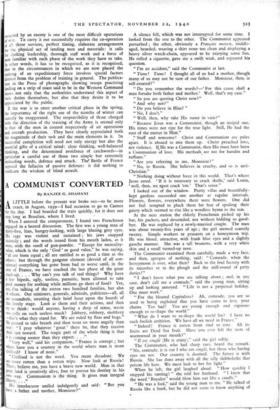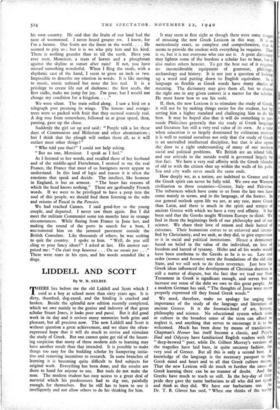A COMMUNIST CONVERTED
By RANJEE G. SHAHANI
A LITTLE before the present war broke out—to be more A exact, in August, 1939—I had occasion to go to Cannes for the day. I had boarded the train quickly, for it does not stop long at Beaulieu, where I lived.
When I entered the compartment, I found two Frenchmen engaged in a heated discussion. The first was a young man of thirty-five, lean, hungry-looking, with large blazing grey eyes. His rage was violent and sustained ; his jaws snapped viciously ; and the words issued from his mouth laden, as it were, with the smell of gun-powder. "Except for mentality value, which is the only ' God ' or good value," he was saying, "all are born equal ; all are entitled to as good a time as the others: but through the gangster element (devoid of all con- science) everything has gone from bad to worse until, in the case of France, we have reached the last phase of the great crack-up. . . . Why can't you talk of real things? Why have a few bipeds, ugly, useless, parasitic, been allowed to take good money for nothing while millions go short of food? Yes, yes, I'm talking of the rotten two hundred families, but also of others. Our ministers, generals, admirals, politicoes—all, all are scoundrels, strutting their brief hour upon the boards of this lovely stage. Look at them and their actions, and then try to think would anyone, having a drop of sense, waste two yells on such useless muck? Jobbery, robbery, snobbery --that's what they stand for. We are ruled by fleas and bugs." He paused to take breath and then went on more angrily than ever: " I pray whatever ' great ' there be, that they receive their just reward. The tragic part of the whole thing is that It is coming sooner than they expect. . . ."
"Very well," said his companion, "France is corrupt ; but Where have you a country in the world where man is more civilised? I know of none."
"Civilised is not the word. You mean decadent. We are more rotten than a rotten tripe. Now look at Russia! There, believe me, you have a brave new world. Man in that great land is creatively alive, free to pursue his destiny in his awn way. Communism is the thing. It gives man integral liberty.. .2 His interlocutor smiled indulgently and said: "But you have a father and mother, Monsieur?" A silence fell, which was not interrupted for some time. I looked from the one to the other. The Communist appeared perturbed ; the other, obviously a Francais moyen, middle- aged, bearded, wearing a shirt none too clean and displaying a heavy silver watch-chain, appeared to be enjoying some fun. He rolled a cigarette, gave me a swift wink, and repeated his question.
"I'm an accident," said the Communist at last.
"Tiens! Tiens! I thought all of us had a mother, though many of us may not be sure of our father. Monsieur, then, is self-created?"
"Do you remember the words?—` For this cause shall a man forsake both father and mother.' Well, that's my case." " So .you are quoting Christ now?"
"And why not?"
"Do you believe in Him?"
"No, I don't."
"Well, then, why take His name in vain?"
"Because Jesus was a Communist, though an insipid one. His times were not ripe for the true light. Still, He had the root of the matter in Him."
." Stuff and nonsense! Christ and Communism are poles apart. It is absurd to mix them up. Christ preached love, not violence. if He was a Communist, then His must have been a Communism of love. His methods are not for bandits and ruffians."
"Are you referring to me, Monsieur?"
"No, to Russia. She believes in cruelty, and so is anti- Christian."
"Nothing doing without force in this world. That's where Jesus erred. 'If it is necessary to crack skulls,' said Lenin, 'well, then, we rust crack 'em.' That's sense."
I looked out of the window. Pretty villas and beautifully- kept gardens succeeded one another at regular intervals. Flowers, flowers, everywhere there were flowers. One did not feel tempted to pluck them for fear of spoiling their gaiety which seemed to rise like a wordless hymn to the sun.
At the next station the elderly Frenchman picked up his hat, his packets, and descended, not without bidding us good- bye. He was replaced by a newly-married couple. The man was about twenty-five years of age ; the girl seemed scarcely twenty. Simple workers or peasants on a honeymoon trip. He was blond, attractive, with frank blue eyes and a slightly gauche manner. She was a tall brunette, with a very white skin and a small turned-up nose.
The Communist examined them carefully, made a wry face, and then, apropos of nothing, said: "Comrade, when the honeymoon is over, what then? Back to the foul factory with its microbes or to the plough and the mill-round of petty duties!"
"I don't know what you are talking about ; and, in any case, don't call me a comrade," said the young man, sitting up and looking annoyed. "Life is not a perpetual holiday. One must work."
"For the bloated Capitalists? Ah, comrade, you are so used to being exploited that you have come to love your chains. Too bad! You are young enough and vigorous enough to re-shape the world."
"What do I want to re-shape the world for? I have no such foolish ambition. We have all we need in France." "Indeed! France is rotten from rind to core. All its fruits are Dead Sea fruit. Have you ever felt the taste of wormwood in your mouth?"
"I/ est cingM (He is crazy)," said the girl softly. The Communist, who had sharp ears, heard the remark. "No, comrade, it is not! who am cingle, but those who having eyes see not. Our country is doomed. The future is with Russia. She has done away with all the silly shibboleths that poison life here. We must look to her for light." When he left, the girl laughed aloud. "How quickly I stopped his ranting! " she told her husband. "I knew that the word ' Royalist ' would blow him out like a candle." "He was a fool," said the young man to me. "He talked of Russia like a book, but he did not seem to know anything of his own country. He said that the fruits of our land had the taste of wormwood. I never heard greater rot. I know, for I'm a farmer. Our fruits are the finest in the world. . . . He seemed to pity us ; but it is we who pity him and his kind. There is nothing grander than to till the earth. Have you ever seen, Monsieur, a team of horses and a ploughman against the skyline at sunset after rain? If not, you have missed something wonderful. When I fling the seeds, with a rhythmic cast of the hand, I seem to grow an inch or two. Impossible to describe my emotion in words. It is like moving to music, music unheard but none the less real. It is a privilege to create life out of darkness: the first seeds, the first stalks, make me jump for joy. I'm poor, but I would not change my condition for a kingdom. . . ."
We were silent. The train rolled along. I saw a bird on a telegraph post preening its wings. The lemon- and orange- trees were so packed with fruit that they seemed scarcely real. A dog rose from somewhere, followed us at great speed, then, panting, gave up the chase.
Suddenly the girl sat up and said: "People talk a lot these days of Communism and Hitlerisrn and other abominations ; but I think that the plough will outlast them all, as it will outlast most other things!"
"Who told you that?" I could not help asking.
"But no one, Monsieur. I speak as I feel."
As I listened to her words, and recalled those of her husband and of the middle-aged Frenchman, I seemed to see the real France, the France that most of us foreigners never appear to understand. In this land of logic and reason it is often the emotions that speak and decide. The intellect, like humour in England, is but an armour. "The heart has reasons of which the head knows nothing." These are profoundly French words. If we were to be privileged to have a peep into the soul of this people, we should find them listening to the sobs and orisons of Pascal in the Pensees.
We had reached Cannes. I said good-bye to the young couple, and departed. I never saw them again. But I did meet the militant Communist some ten months later in strange circumstances. While fleeing from France in June last, and making the round of the ports in search for a boat, I encountered him on the jammed pavement outside the British Consulate. Like thousands of others, he was seeking to quit the country. I spoke to him. "Well, do you still cling to your fancy ideas?" I asked at last. His answer sur- prised me: "On etait trop heureux . . . On ne savait pas . . ." There were tears in his eyes, and his words sounded like a dirge.



























































 Previous page
Previous page